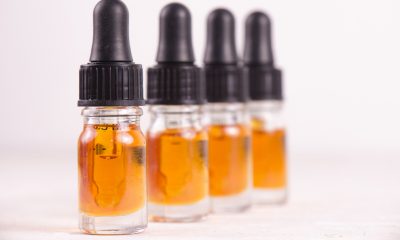Scotland’s call for the decriminalisation of drug use has been welcomed by international experts in policy and public health, but the UK government is sticking with its ‘tough stance’ on drugs.
Scottish leaders say it’s time to start approaching drug use from a public health, rather than criminal justice, perspective as a bold new report calls for the decriminalisation of all drugs for personal use.
In the report, published on Friday 7 July, the Government calls for a ‘caring, compassionate and human rights-informed approach to drug policy’ that is informed by public health and harm reduction.
It comes following recent calls from UN experts to end the global ‘war on drugs’ with members of the Human Rights Council recommending the decriminalisation of drug use as a ‘matter of urgency’.
Scotland is in the midst of a ‘public health emergency’ when it comes to drug use, according to the report, with the highest rate of drug-related deaths in Western Europe – and three times the rate of the UK as a whole.
There were 1,330 drug misuse deaths registered in 2021, the second highest annual total on record, with the rise in drug deaths so significant it has contributed to a fall in life expectancy in Scotland.
Drug use disorders are now the third biggest contributor to population health loss following heart disease and dementia – but as the report highlights it is the only cause listed for which users are criminalised.
The independent Scottish Drug Deaths Taskforce has previously recommended an urgent review of the Misuse of Drugs Act to allow for a more public health-focused approach to policy, but this along with similar recommendations from the Scottish Affairs Committee and Westminster Health and Social Care Committee, have so far been rejected by the UK government.
Scotland’s leaders say they want to follow an ‘evidence-based’ approach and learn from other countries which have led the way in drug reform, including those with decriminalisation models, such as Portugal and regulated cannabis markets as in Canada.
The report states: “Using the evidence from other countries, decriminalising drugs for personal use would help and support people rather than criminalise and stigmatise them; freeing individuals from the fear of accessing treatment and support, reducing drug related harms and, ultimately, improving lives.”
“In calling for decriminalisation for personal use, we recognise that it would not solve our drug crisis by itself. But it could provide a framework within which we can better pursue our existing policies to help, treat and support people rather than criminalise, stigmatise and fail them.”
The report goes on to explore the potential benefits to considering a regulated market for the safe control of substances in order to tackle organised crime. It uses Canada’s staged approach, in which new legal cannabis products were introduced slowly over time, as an example and poses the idea of a Citizens’ Assembly – as is currently ongoing in Ireland – to gauge public support.
Other measures which could be adopted to reduce harm include age restrictions, price controls, regulation of advertising and providing consumers with educational resources and information on aspects of drug use such as effects, preparation, storage, side effects, risks and where to access support.
Author of the report, Scottish Minister for Drugs and Alcohol Policy, Elena Whitham, called on the UK government to engage with them in the introduction of ‘meaningful drug reform’.
She concluded: “A fairer, safer and healthier country must care about all its citizens and be inclusive of those with health conditions such as drug dependence. Future generations, our children and grandchildren, have a right to health and happiness. They have the right to live in a country where they are helped and supported, not stigmatised and punished for their health conditions.”
A ‘bold and very welcome’ policy change
The report has been widely welcomed by drug policy, law enforcement and public health experts.
In response, Ian Andrew of LEAP [Law Enforcement Action Partnership] Scotland, a former police inspector, said it was a day he never thought he’d see.
“This is a bold and very welcome policy change from the Scottish government. I never thought I would ever see this in my lifetime,” he said.
“It’s a big step in the direction of a regulated market where we take control away from criminal elements. I’ve come through 32 years of policing and this is a way that I can voice what so many police officers are actually thinking. Police officers can’t speak out, despite the fact that the vast majority recognise that it isn’t working.”
The UK’s Faculty of Public Health also welcomed the report, commending the Scottish government for its ‘leadership’.
“We must have an evidence-based approach to drug policy, which has health at its foundation and does not stigmatise and punish. Evidenced, properly funded programmes to reduce harm are a key cornerstone of an effective population health approach,” it stated.
“The Faculty commends the Scottish Government for their leadership in this area. Without this legislative reform across the UK, people will continue to use drugs – and continue to die – without the services and support that would protect them from harm.”
Meanwhile, global community-led organisations working to reduce the harms caused by drug use published a letter of endorsement for the Scottish government’s approach.
The letter, signed by a number of individuals and drug user rights organisations including, European Network of People who Use Drugs (EuroNPUD), International Network of People who Use Drugs (INPUD), Hepatitis C Trust, Scottish Drugs Forum and Recovering Justice states: “Our advocacy and good practice discussions with the United Nations and European Union highlights the growing acknowledgement about the need for enhanced harm reduction, humane drug treatment and full decriminalisation. This is founded on the growing consensus that our global drug control regulations have failed by any objective measure.
“The Westminster Government abandoned the famed ‘British Drugs Model’ and the move away from a comprehensive harm reduction approach has been at the expense of the lives and health of people who use drugs.”
They added: “As community-led organisations, we welcome Scotland’s willingness to embrace science and work with affected communities to transform our failed drug laws.”
UK government sticks with ‘tough stance’ on drugs
However, the response from Westminster has been predictably poor, with some outlets reporting that the Prime Minister Rishi Sunak dismissed the proposals within an hour.
According to the Associated Press, Max Blain, spokesman for Prime Minister Rishi Sunak, said: “There are no plans to alter our tough stance on drugs.”
Meanwhile, Russell Findlay, justice spokesman for the Scottish Conservative Party, said that ‘essentially legalising’ class-A drugs would not solve the drug deaths problem.
There was equally little support from the left, with Shadow Chancellor Rachel Reeves saying in an interview during a visit to Hamilton, near Glasgow, that a Labour government would not decriminalise drug supply or possession.
She added: “I find it quite stunning that this would be a priority for the Scottish Government when we’re here today talking about the Tory mortgage bombshell and what we would do to address that.
“We’re here meeting people training to do jobs in the industries of the future. We’ve got more than 700,000 people in Scotland on NHS waiting lists – pick an issue.”
Accompanying her, the Scottish Labour leader Anas Sarwar, blamed the government’s cuts to ‘alcohol and drug health partnerships’ and ‘failure to properly invest in mental health services’ for the high numbers of drug-related deaths in Scotland.
The response is likely to reinforce the Scottish National Party’s (SNP) calls for Scottish independence and further devolution of powers from Westminster to allow leaders to implement their own laws.
Ben Lawrie, drug policy spokesperson for the Scottish Liberal Democrats said the report was ‘very welcome’ but was not optimistic that the Conservative government would engage in any positive way.
“[The report] reflects a growing awareness that the outdated war on drugs is not fit for purpose and that a new approach is needed. My worry however, is that this becomes just another constitutional football kicked about between the UK and Scottish Governments,” he told Cannabis Health.
“[It’s] very unlikely the Conservative-led UK Government will do anything. I believe the response they’ve given is the stock response they give to all drug reform petitions and queries. The report from Scotland very much flies in the face of current conservative policy of maintaining the drug war and focusing on policing and law enforcement. Policies that we know increase the instability of the situation and keep users at risk.”
Home » News » Scotland praised for ‘bold and welcome’ proposals to decriminalise drug use

 Science5 months ago
Science5 months ago
 Industry6 months ago
Industry6 months ago
 News5 months ago
News5 months ago
 News6 months ago
News6 months ago
 Health5 months ago
Health5 months ago
 Health3 months ago
Health3 months ago
 Science5 months ago
Science5 months ago
 Cannabis explained5 months ago
Cannabis explained5 months ago












